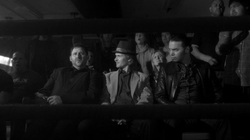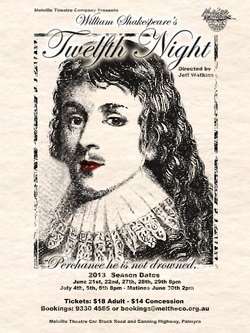
Well, tomorrow it is back to filming for The Silent City. I have four more scenes for Jack to do, and this Saturday is a big one. A total of seven hours on set as it is scheduled, but who knows, it may be more. At least this time around, it will be during the day as opposed to the late evening at near zero temperatures. Which reminds me, I must review my lines tonight, just to have them fresh in my mind.
Coming from a background dominated by theatre, I have been told many times about how different theatre and film are. Well, I'm here to say that that is a load of bollocks. There is no difference when it comes to acting. Sure, theatre is all-in-one-take and film has edits, camera angles, and is more start and stop, but the performances required of the actor are no different.
The "volume" of a performance in theatre can vary depending on the size of the theatre and the closeness of the audience. If you are playing to a small 50-seat private theatre where the audience are sitting right at the edge of the stage, you would play a more intimate and toned down performance than if you were to play to a 500 seat, multilevel Regal Theatre. Cinema is no different in that aspect except that the size of your performance can change in the progression of a single scene, from an extreme close-up to a long shot, then back again. The technical aspects may be different, but how you perform or act remains the same.
Once I was able to, as Yoda put it, unlearn what I had learnt, i.e. that film requires a completely different style of acting, I found the process far more enjoyable. I am still creating a character with ideals, purpose, plans, associations and flaws, just as I would in theatre. That character is still reacting to various events occurring around them, just as in theatre. From this base point of view, there is no difference between the two.
That being said, I found one thing different in film that I did not expect; it offers the opportunity for a more varied performance. The audience can be, at any moment, close or far and coming from any angle. You are no longer playing to a fixed imaginary "fourth-wall" as this is now a moving point in space. As an actor, you still need to be aware of this point in space just as much as you need to be aware of the fourth-wall in theatre. You are still performing for an audience after all, but as it is no longer fixed, you now have an extra dimension to perform with.
Tomorrow I return to the film set. It will be a large set with a large number of extras and ... things going on. It will be busy and most of all, exciting. Yet I will still be the same; Jack O'Rielly, with all his traits and faults.
Coming from a background dominated by theatre, I have been told many times about how different theatre and film are. Well, I'm here to say that that is a load of bollocks. There is no difference when it comes to acting. Sure, theatre is all-in-one-take and film has edits, camera angles, and is more start and stop, but the performances required of the actor are no different.
The "volume" of a performance in theatre can vary depending on the size of the theatre and the closeness of the audience. If you are playing to a small 50-seat private theatre where the audience are sitting right at the edge of the stage, you would play a more intimate and toned down performance than if you were to play to a 500 seat, multilevel Regal Theatre. Cinema is no different in that aspect except that the size of your performance can change in the progression of a single scene, from an extreme close-up to a long shot, then back again. The technical aspects may be different, but how you perform or act remains the same.
Once I was able to, as Yoda put it, unlearn what I had learnt, i.e. that film requires a completely different style of acting, I found the process far more enjoyable. I am still creating a character with ideals, purpose, plans, associations and flaws, just as I would in theatre. That character is still reacting to various events occurring around them, just as in theatre. From this base point of view, there is no difference between the two.
That being said, I found one thing different in film that I did not expect; it offers the opportunity for a more varied performance. The audience can be, at any moment, close or far and coming from any angle. You are no longer playing to a fixed imaginary "fourth-wall" as this is now a moving point in space. As an actor, you still need to be aware of this point in space just as much as you need to be aware of the fourth-wall in theatre. You are still performing for an audience after all, but as it is no longer fixed, you now have an extra dimension to perform with.
Tomorrow I return to the film set. It will be a large set with a large number of extras and ... things going on. It will be busy and most of all, exciting. Yet I will still be the same; Jack O'Rielly, with all his traits and faults.

 RSS Feed
RSS Feed

